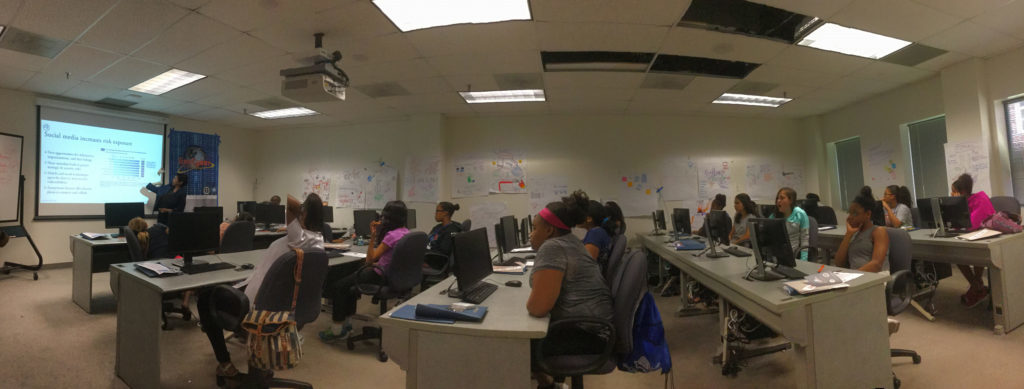Updated: April 24, 2017 at 11:48 a.m.
A National Security Agency grant will fund a free camp for middle school girls on campus this summer.
The free GenCyber cybersecurity day camp will host about 20 students on the Mount Vernon Campus from June 19 to June 30. Shelly Heller, a professor of engineering and applied science who is overseeing the camp, said the event will stimulate the campers’ interest in computer science at a young age and encourage more women to pursue careers in computer science.
The NSA is providing a $100,000 grant to fund the camp this year, $20,000 more than a year ago. Heller said the new increased funding will help create an online camp with lessons and activities that the students will be able to access nightly with their parents.
The virtual camp will include an activity and review of that day’s topic, which will range from networking to forensics.
“This will strengthen what the campers learned during the day, but it will teach the parents,” Heller said. “The parents will learn alongside them and learn good internet practices themselves.”
Heller said the camp was designed a year ago with the intention of exposing young women to science, technology, engineering and math fields while advertising safe online practices like creating secure passwords. Heller applied for the NSA grant again this year and decided to include a proposal for the virtual camp.
Two middle school STEM teachers and two GW computer science students will teach the students and help with daily activities like scavenger hunts, case studies and question and answer sessions. The camp will also take students on field trips to the National Cryptologic Museum and the Spy Museum in downtown D.C.
Heller said having two college student counselors will allow the campers to learn about potential majors and career opportunities in computer science through a relationship with a “near peer,” someone close to the students but a bit older in age.
“It is one thing for me to tell a junior high kid, boy or girl, that this is a career for them, but I am so far away from them,” she said. “These near peers have much more relevance to high school and junior high kids.”
Students in the local area can apply for the camp online and need to answer open-ended questions about why they care about computer science or cybersecurity. The camp runs for two weeks from 9 a.m. to 4 p.m. daily, with aftercare provided from 8 a.m. to 5 p.m.
Heller, who has been at GW since 1985, said much of her work has involved recruiting and retaining women in the STEM fields, an effort that inspired her to start the camp last year. She said to increase the number of female professors in STEM, students must be introduced to the fields at a young age to build confidence and interest in the subject.
“I’ve worked with students and you need to raise the women’s interest early and you need to give them the confidence that this is an interesting opportunity and they can do it,” Heller said.
Women are consistently underrepresented in computer science and STEM fields. A recent study by the National Science Board’s Science found just 10.7 percent of electrical or computer hardware engineers are women, and only 17.9 percent of bachelor’s degrees earned in the computer science field are by women.
GW has been working to increase the numbers of women in STEM undergraduate and graduate programs. Out of the 15 computer science professors at GW, six are women.
Vernecia Griffin, an instructional technology teacher and academic support team leader at Jeffers Hill Elementary School in Columbia, Md., will be one of the camp’s instructors. She said the camp will bring in female professionals in the field, helping attendees learn about potential careers within the cybersecurity field and giving them a bit of insight into their job title and education path.
“They also discuss the challenges they may encounter, being a female in a male-dominated field,” Griffin said.
This post was updated to reflect the following correction:
The Hatchet incorrectly reported that Shelly Heller is the associate provost for academic affairs at the Mount Vernon Campus. She no longer holds this title. We regret this error.





